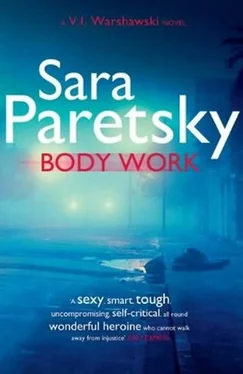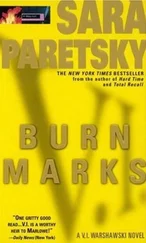“That paintbrush with the glass-at the time, I wondered if the Artist or Olympia did it as a publicity stunt. I’m still not convinced they didn’t. But Nadia could have sabotaged it, or even Chad, I suppose.”
“Could be. Olympia’s been hurting along with the rest of the economy. If she thought it would bring in business, she’d cut her own wrists in front of a webcam.”
“Would you?”
Sal laughed. “Hell, no. I’m quite attached to my own good looks, thank you very much.”
I looked at her seriously. “You’re tough, Sal, and one of the strongest people I know. But you’re sane. What you just said about Olympia, you may have meant it as a joke but the very fact that such an image came to your mind means you feel what I’m talking about, that edgy, danger-daring quality.”
“You’d be the expert on that particular bit of human nature, Warshawski. You going to drink that whisky or just play spin the bottle all night?”
“Neither.” I handed Sal my AmEx card. She used to run a tab for me when she and I first opened our businesses twenty years ago, but those days have disappeared with the rest of the economy.
I took side streets going home. I was tired, and whisky at the end of a long day hadn’t been the smartest move before getting behind the wheel. Sal’s response to my questions about Olympia hadn’t done anything to dampen my enthusiasm for my case. That was because my enthusiasm level had been low to begin with. Chad with a Glock on the pillow next to him was a high hill to climb over, and I didn’t think I’d find an easy path on the other side.
I hadn’t actually seen any ballistic or forensic evidence in the case. In the morning, I’d check with the ME on that. In the meantime, before going to bed, I turned on my laptop and logged on to my subscription databases; they could spend the night hunting for information about Nadia Guaman. For good measure, I also asked about Olympia, Karen Buckley, and Chad Vishneski.
When the alarm woke me at six, I wanted to shoot it or scream, or something. I’ve never been much for early mornings, and when it is pitch-black, with the kind of cold that makes you feel your head is strapped inside iron bands, it takes every ounce of will not to pull the covers over your head and wait for spring.
“Bunter!” I cried. “Bunter, get that cappuccino machine fired up. And look smart about it!”
What a strange fantasy, to imagine someone who was dressed and ready to do your bidding at whatever hour it pleased you to bid him. So very obviously politically and socially incorrect, and yet how much I longed for my own Bunter. I flung the covers back and ran across the cold floor to the kitchen, where I put on my espresso maker, before tiptoeing to the bathroom.
I turned the thermostat up to sixty-eight before collecting the dogs from Mr. Contreras.
When I got home and thawed out, I sat at my laptop with my second espresso. LifeStory, an innocuous-sounding outfit, for whose detailed searches into everyone’s lives I pay eight grand a year, had sent me a profile of Nadia Guaman.
Guaman had gone to Columbia College in the south Loop after a childhood in Pilsen and high school at St. Teresa of Avila. Her father, Lazar, worked as a baggage handler up at O’Hare; her mother, Cristina, was a cashier at a Pilsen hardware store. They still lived in the bungalow on Twenty-first Place where Nadia had grown up.
Nadia had been the oldest of Lazar and Cristina’s three surviving children; another daughter, Alexandra, had died three years ago. The youngest, Clara, a high school senior, was also at St. Teresa. Their only son, Ernest, had been training as an electrical engineer when his motorcycle flipped him onto Cermak Road two years ago. His brain injuries left him unable to work.
I squeezed my eyes shut. The pain the Guamans lived with every day, one child already dead, their son terribly disabled, and now a daughter murdered-I couldn’t imagine how you survived such losses and kept any vestige of your sanity or humanity.
I returned to the screen and studied the financial details another of my subscription databases, the Monitor Project, had dredged up. Nadia’s bank account was modest; she had earned about forty thousand in a good year. Her rent on the one-bedroom on the fringe of Humboldt Park-the part where gangs and gentrifiers lived in uneasy proximity-ran just under nine hundred a month. She didn’t own a car. The computer hadn’t come upon any financial instruments, if such things still existed, in her name.
Nadia hadn’t been party to any lawsuits. LifeStory and the Monitor Project aren’t a substitute for routine surveillance. They didn’t give me any details on Nadia’s private life-who she dated, how well she’d known Chad Vishneski, if she and Karen Buckley or Olympia had been lovers. All I could tell was that she’d never filed an order of protection or complained of stalking or harassment.
The reports did give other, more intimate information, the kind you assume is private to you alone. I felt filthy, exploring Nadia’s medical history, but I wanted to know if she’d had any treatment that might imply an abusive relationship. No recent broken bones, no STDs. By the time I’d been through the whole file, I just had time to shower and change for my first appointment of the morning. I’d look at the reports on Chad, Olympia, and Karen Buckley later.
Now that the police had identified her killer, they’d released Nadia’s body to her family. The funeral was scheduled for this afternoon at Ayuda de Cristianos, in Pilsen. I put on my tailored black suit so that I could go directly to the church from my downtown meeting.
Nadia’s family was gathered around her open coffin, the parents in black, the surviving daughter defiantly flaunting turquoise eye shadow and a pink jersey minidress. Their son, Ernest, was wearing a black suit and tie, but he was twitching and shaking his arms and occasionally letting out little yipping noises. An older woman, perhaps a grandmother, was scolding him.
I joined the obligatory parade up to the family. Lazar Guaman stood like a statue, unable to respond to anyone who spoke to him, seemingly unaware of his son. For Cristina Guaman, Ernest seemed to provide a welcome distraction. Rubbing his neck, or taking his hands when he started sticking them down his trouser front, or hushing his shriek of a laugh seemed to calm her, to give her a kind of purpose.
I murmured condolences, and Ms. Guaman directed me to the coffin.
“Our Nadia looks like the angel in heaven she’s become.”
I moved reluctantly to the open coffin. I’d last seen their daughter in Club Gouge’s parking lot, in pain and covered in blood, but here she lay as calm as if she were in a tranquil sleep. Her face, stripped of the tormenting anger I’d witnessed at Club Gouge, looked heartbreakingly young in death, almost a child’s face. The effect was heightened by the lacy white pillow on which she lay.
The funeral people had covered her torn-up chest with a pale blue frock, a girlie outfit very different from the jeans and outsize shirt she’d worn for her Body Artist painting. Was it good, was it bad, to turn the dead into dolls like this?
Someone who seemed to know the family was speaking to Ms. Guaman, when Ernest shouted, so abruptly that I jumped, “Nadia flew, she flew to Jesus! Allie is a dove, flying around and around and around!” and he started to laugh.
The outburst didn’t startle his family. “Your sister is an angel, not a dove,” scolded the woman who’d been speaking to Ms. Guaman, while the daughter said, “Not in church, Ernie, don’t yell in here.”
Ayuda de Cristianos was one of those cavernous old churches that dated to the time when Czech immigrants settled this part of Chicago. Back then it was known as St. Ludmila’s, and the grim details of the saint’s life still filled the narrow stained-glass windows. The nave was made of concrete, with a vaulted ceiling that must have stretched a good hundred feet above us. Everyone’s footfalls echoed and re-echoed; each time the street door slammed, Ernest roared with laughter and imitated the noise.
Читать дальше












